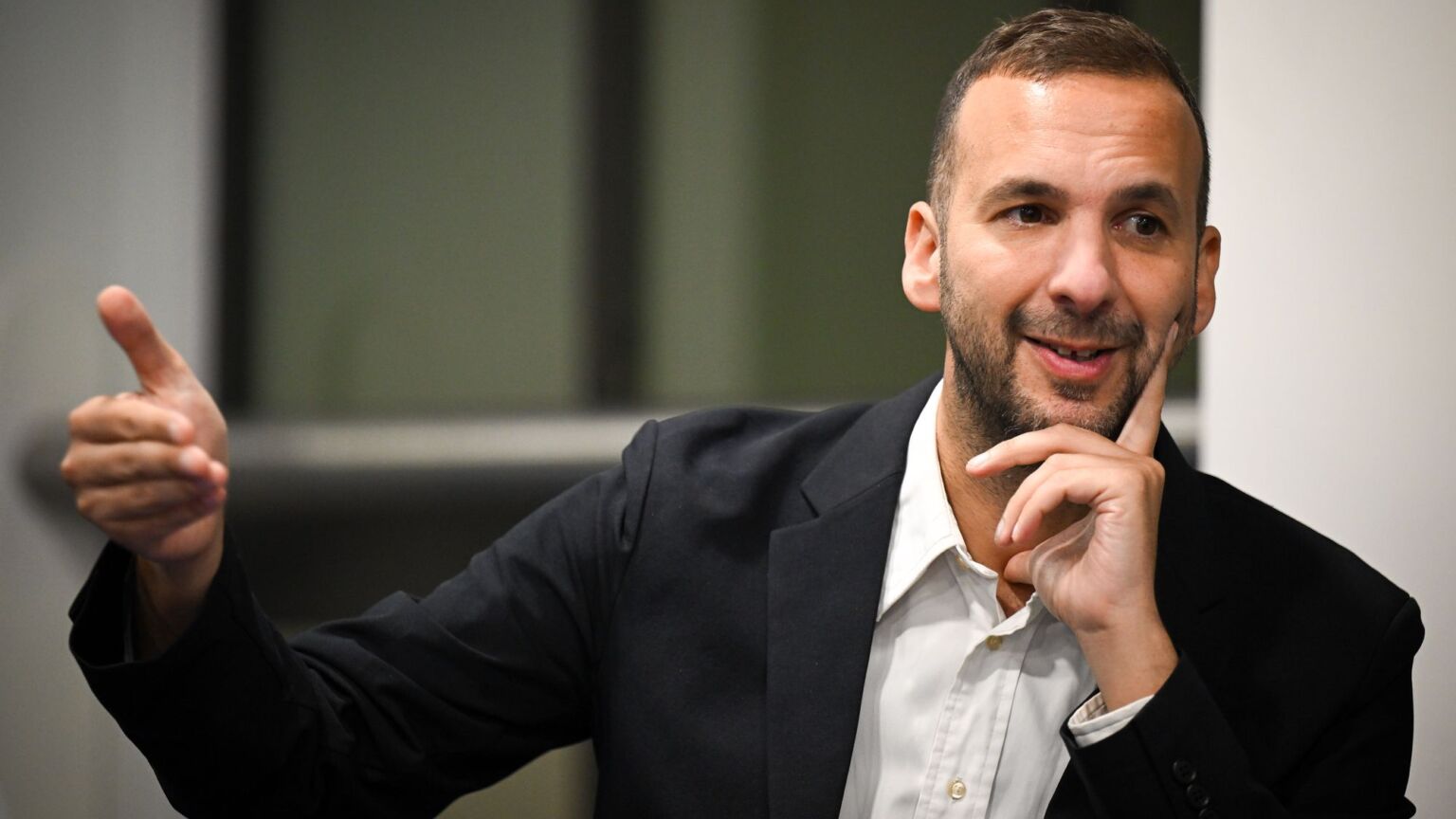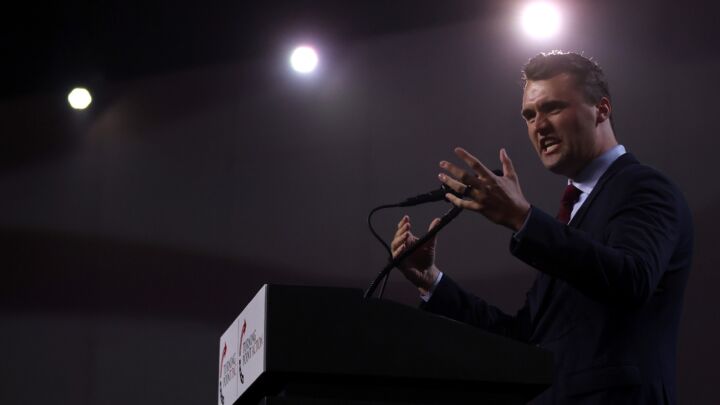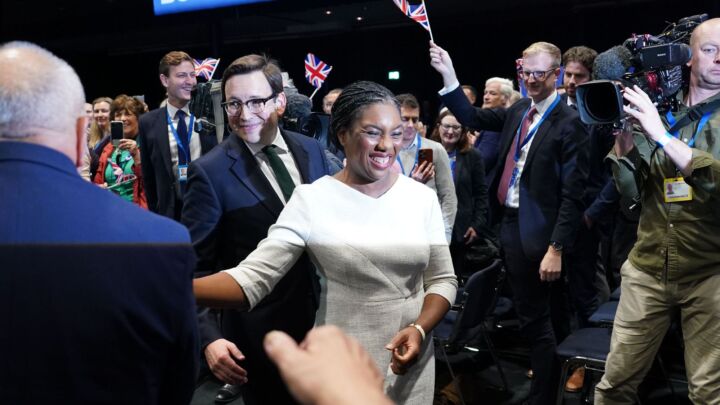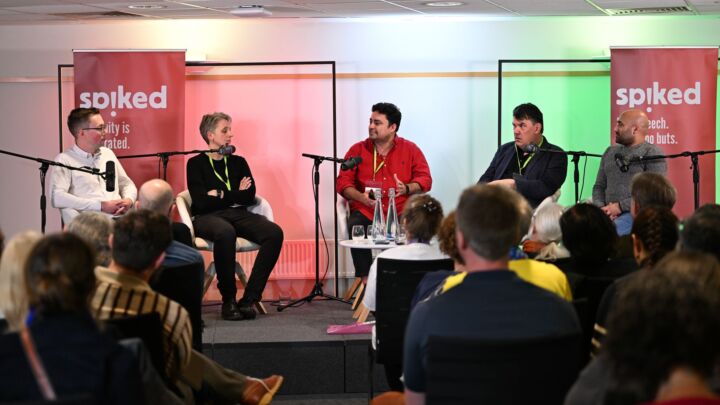Why the Greens are such a magnet for kooks and cranks
This curious band of tree-huggers, wokists and staunch Muslims speaks to the incoherence of the modern left.

Want unlimited, ad-free access? Become a spiked supporter.
If you thought the Labour Party’s recent edicts at its conference were confused and contradictory – ‘Reform UK’s policies are so repellent to all decent people that we’re going to borrow them because most people agree with them’ – the Green Party has seemingly managed to exceed them for sheer incongruity and incoherence.
Earlier this week, at the Green Party conference in Bournemouth, senior Green politician Faaiz Hasan told a meeting of the Muslim Greens that Muslims now have the opportunity – ‘politically’ – to ‘eliminate’ and ‘decapitate’ some of the ‘nastiest politicians we have in the country’. Hasan’s outburst confirms two well-founded suspicions. The first is that the Green Party has strayed wildly from its original mission to save the planet; pursuing an Islamic identity politics is now a priority for many members. The second is that people with supposedly nice and cuddly politics often say the most dreadful and incendiary things.
Also this week, party members at the Green conference passed a motion seeking the ‘effective abolition of private landlordism’. We have long suspected that Greens live in a fantasy world, but now we have confirmation that their detachment from reality extends to the economic and social spheres.
What really exposes the Green Party’s intellectual disarray is a recent lurch towards libertarianism (at least on social issues). On Friday, new leader Zack Polanski said that all drugs, including heroin and crack cocaine, should be legalised because ‘the war on drugs has absolutely failed’ (so has the ‘war on’ murder and rape, Zack). Polanski takes the same laissez-faire attitude to the matter of illegal migration. He will solve it by making it legal. He will ‘stop the small boats’ by allowing their would-be passengers to enter Britain via ‘safe and legal routes’.
Yet such overt libertarianism sits in direct contradiction with the Greens’ traditional communitarianism. Speaking of Nigel Farage, Polanski promised last week that ‘the Greens will never dance to the tune of a Trump-loving, tax-avoiding, science-denying, NHS-dismantling corporate stooge’. But how can you believe in the imperative of paying taxes, conscientious citizenship and the inviolability of the NHS, if you are happy for this country’s population to grow at an unsustainable rate, largely thanks to immigration? Or if you give a green light to the use of hard drugs, with the added burden the inevitable rise in addiction cases will place on the NHS?
The Green Party is in a state of confusion because it is a party beholden to modern, progressive liberalism. This is an ideology that has always been torn between its two mutually held and mutually exclusive beliefs: the sacrosanctity of the individual and the right of the state and party to dictate what is good for the collective. It’s no wonder the Greens’ pronouncements don’t really make any sense.
The making of a mental-health crisis
The UK’s mental-health crisis is set to become one of the defining issues of the decade. Its human cost in terms of squandered opportunities and wasted lives is huge. The financial cost to the state is no less vast. And the worst thing? This crisis continues to worsen, because having ‘mental-health problems’ is a self-perpetuating self-diagnosis.
The surge over the years in low-level mental health complaints, such as mild depression or anxiety, is arguably down to two factors. The first is a shift in our culture, beginning in the 1990s, towards placing greater emphasis on introspection, by which it became the norm for people to ‘get in touch with their feelings’ – and forever dwell on them. This triumph of the therapeutic ethic of human fragility rendered a new generation wholly unprepared for a second fatal event: the Covid lockdowns of 2020 to 2021. During those years of isolation and inaction, the propensity for introspection metamorphosed into one of morbid introversion, with those mired in this mindset sucked into a doom spiral with no seeming escape.
So it was depressing to read recently that children are being nudged into believing that they have mental-health problems. As Celia Walden related a few weeks ago in the Telegraph , there is a new insidious variant of those ‘wellbeing questionnaires’ currently being handed out in secondary schools. Entitled the #BeeWell Survey, it has a section dedicated to ‘Emotional difficulties: Me and My Feelings’, in which pupils are required to respond to the following bald statements: ‘I feel lonely’, ‘I am unhappy’, ‘Nobody likes me’ or ‘I cry a lot’.
Instilling in suggestible, underdeveloped minds the idea that something should be wrong with them cannot have any positive outcome. The current diet of anxiety fed to children will only entrench that anxiety, rather than alleviate it. Young people, encouraged at every opportunity to worry about real or invented problems, are instead more likely to become tomorrow’s neurotic and incapable young adults.
As with a radical trans movement, adults beholden to a novel credo have been imposing their damaging beliefs on to children. Instead of transmitting a corrosive, angst-infused ideology onto the young, Generation X should be teaching them the eternal, harsh and unlovely veracities of the human condition. This is the truth that most of our internal emotional problems can’t be solved, only endured and managed, because our inner selves are unfathomable and our subconscious unknowable. Being unhappy doesn’t represent a maladjustment or abnormality, and sometimes being stressed or feeling despondent is normal. For most people, these bad feelings will pass.
Alan Partridge has burst the ‘mental health’ bubble
After his somewhat flat previous outing, This Time, Alan Partridge is back on the BBC and he’s on ruddy good form. Steve Coogan’s monstrous creation may be ageing, but it’s heartening to see that he remains the same, slightly unhinged oddity we came to love and squirm at in the 1990s.
The subject matter of the new series, How Are You? It’s Alan (Partridge), is, fittingly enough, mental health. And you can detect that either the creator or his monster isn’t entirely persuaded by talk of an epidemic of mental health today, or by those who would seek to jump on the bandwagon. ‘Today, bravely, I can reveal that I too have mental problems’, Partridge announces at the beginning of the opening episode – the joke being that there is nothing remotely brave, novel or interesting about the supposed inner turmoil of television celebrities.
Alan Partridge, as his loyal fans will remember, did have a moment of madness, when he drove to Dundee in his bare feet. He also had his own addiction problems… to Toblerone. But this doesn’t constitute a man with a life-debilitating mental-health condition. Petty, gauche, offensive, vindictive, resentful and lacking empathy, Partridge may be all these things. But mentally ill he is not.
Patrick West is a spiked columnist. His latest book, Get Over Yourself: Nietzsche For Our Times, is published by Societas.
You’ve read 3 free articles this month.
Support spiked and get unlimited access.
Help us hit our 1% target
spiked is funded by readers like you. It’s your generosity that keeps us fearless and independent.
Only 0.1% of our regular readers currently support spiked. If just 1% gave, we could grow our team – and step up the fight for free speech and democracy right when it matters most.
Join today from £5/month (£50/year) and get unlimited, ad-free access, bonus content, exclusive events and more – all while helping to keep spiked saying the unsayable.
Monthly support makes the biggest difference. Thank you.










Comments
Want to join the conversation?
Only spiked supporters and patrons, who donate regularly to us, can comment on our articles.